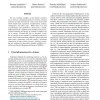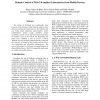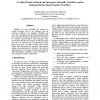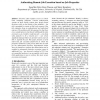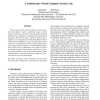146
Voted
ESCIENCE
2006
IEEE
15 years 5 months ago
2006
IEEE
We view scientific workflows as the domain scientist's way to harness cyberinfrastructure for e-Science. Domain scientists are often interested in "end-to-end" fram...
113
Voted
ESCIENCE
2006
IEEE
15 years 5 months ago
2006
IEEE
The design of WebLabs has traditionally been focused on the hardware rather than the software side. However, paying more importance to the software side can bring about important ...
128
Voted
ESCIENCE
2006
IEEE
15 years 5 months ago
2006
IEEE
ct In this paper we present an extension to devise and implement advance reservation as part of the scheduling and resource management services of the ASKALON Grid application deve...
142
Voted
ESCIENCE
2006
IEEE
15 years 5 months ago
2006
IEEE
Workflow is a key technology for eScience. It enables scientific tools to be composed and the resulting workflows to be managed. Workflow and most other computing tools typically ...
134
Voted
ESCIENCE
2006
IEEE
15 years 5 months ago
2006
IEEE
Instruments and sensors are the primary sources of data driving science and the development and refinement of theory. A critical component of eresearch yet to be clarified is the ...
100
Voted
ESCIENCE
2006
IEEE
15 years 5 months ago
2006
IEEE
: E-Science often requires access to remote Grid computing platforms. Current authorization systems on these remote systems have largely based decisions solely on the identity of t...
118
click to vote
ESCIENCE
2006
IEEE
15 years 5 months ago
2006
IEEE
In this paper we present a general domain for the analysis of workflows and workflow components based on the notion of a collection of Turing machines sharing a set of tapes. We s...
66
Voted
ESCIENCE
2006
IEEE
15 years 5 months ago
2006
IEEE
148
Voted
ESCIENCE
2006
IEEE
15 years 5 months ago
2006
IEEE
As the large volume of resources involved and the power of computational Grids increased, there is a corresponding and urgent need for employ the grid technologies into problem so...
92
Voted
ESCIENCE
2006
IEEE
15 years 5 months ago
2006
IEEE
The necessity of a lab course on computer security arises from the students' need to complement course work by hands-on experience. In order to meet the distance teaching dem...
